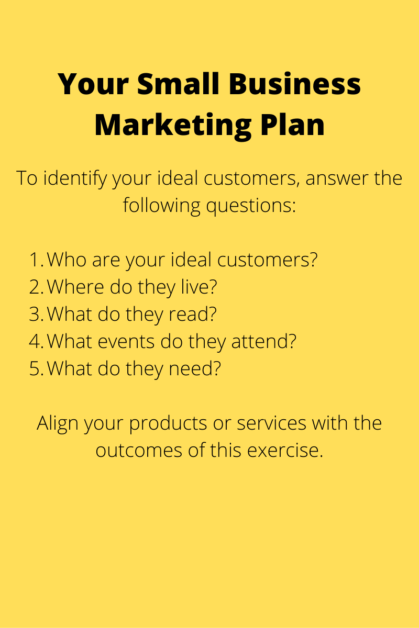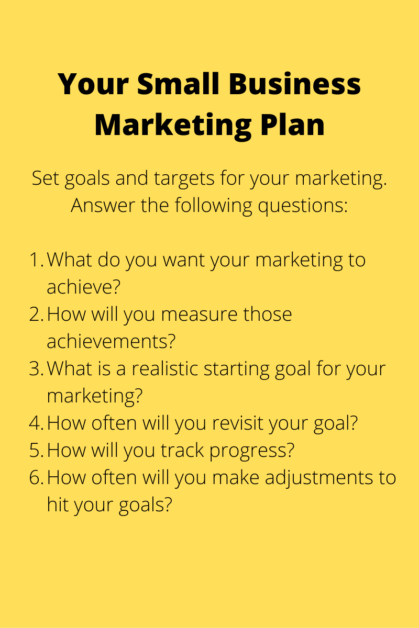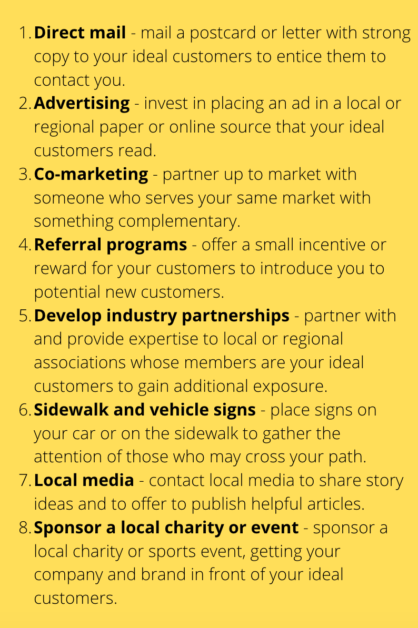Is your small business marketing plan delivering a steady flow of customers like you expected?
Do you even have a small business marketing plan?
If not, don’t fear because you aren’t alone.
It’s estimated that nearly 20% of all small businesses fail within the first year. An additional 30% fail by year five.
One of the main reasons for this failure is a lack of effective small business marketing.
Many business owners are great at what they do, but not as great at telling the world about the value they can provide. Still, others struggle at introducing marketing that is relevant and timely for today’s customers.
Making your business known begins with creating awareness and appeal in the marketplace that attracts ideal customers to the business.
In other words, you need effective marketing.
The strategy behind your small business marketing plan is to focus on conveying value. How can you help your ideal customers?
You need to be specific. Fluff doesn’t work.
This guide will walk you through how to develop your own small business marketing plan. It will also provide you with insights on the various ways in which you can convey the value your small business provides.
Best of all we’ll discuss how to minimize the investment of time and money to ensure the fastest and most cost-effective outcomes.
Sound like a plan? Let’s go!

Your Small Business Marketing Plan
The starting point for any small business marketing plan is to fully understand who your ideal customers are. This exercise can take a little time, but is an important first step.
You need to ensure that any marketing you do is aimed directly at your perfect target market.
After all, if you aren’t marketing to the right people, you’re wasting both time and money.
Understand Your Market
To fully understand who you should target your marketing towards, identify exactly who your ideal customers are.
You can do this by simply answering a series of questions. The results will provide you with clarity about which type and approach to marketing you should take.

Identify Your Market Niche
With your target market now clearly identified, you are ready to define your niche. Being clear on the niche that you serve will allow you to target your marketing to the right audience.
A niche is a specialized section of the population. It’s the people you want to have as customers.
By identifying your niche you can narrow down your marketing message to ensure it speaks directly to the people you are targeting.
As Dan Kennedy, grandfather of Direct Response Marketing once said, “There are riches in the niches.”
It is better to have a targeted marketing message that speaks to a segment of the population, rather than a broad marketing message that speaks to no one.
So what niche are you going to serve? Are they dentists, tourists, lawyers, manufacturers, convenience store owners?
Determine Your Brand Identity
Your brand identity is how you want others in your niche to recognize you. Are you the number-one provider of a product? Are you a sought-after expert in a certain area?
By defining how you want to be recognized, you can begin referring to yourself in this manner. In doing so you set yourself apart from the competition. You’ll become known for whatever it is that you refer to yourself as. Skidoo, Xerox, and Kleenex have done this, and so can you!
Craft Your Elevator Pitch
If your ideal customers aren’t clear on how you can help them, chances are they’ll ignore you.
Your elevator pitch, is a brief statement that tells others exactly who you help, and how you help. You can have more than one elevator pitch, but for our purposes, let’s nail down one.
Here is an example of one of Starbucks’ elevator pitches:
“We provide students with affordable, fast coffee plans to make college a little easier and a little cheaper.”
Design a Logo and Other Marketing Assets
If you want to stand out from your competitors, you need to have a logo to set yourself apart. You may have a creative idea that you can develop on your own, using tools like canva.com.
Alternatively, you can share information about your business and ideal customer with a graphic designer who will provide you examples to choose from. If you don’t know a graphic designer, you can always get one on fiverr.com or upwork.com. You can also have designers compete for your business on platforms such as crowdspring.com.
With a custom-made logo, you can brand any and all materials related to your business that your customers will see or use. From napkins and letterhead, a custom logo is the first step to developing your marketing collateral.
Set Goals and Targets:
One of the key steps in developing your marketing plan is to set goals and targets for your marketing. This step is often overlooked, which will waste your time and small business marketing budget unnecessarily.

Build Your Database
There is a saying, that without a list a company has no business.
When you consider that marketing is all about making connections and letting customers know how you can help, then having a list is crucial. A list is one of the only ways to consistently put your marketing in front of existing, past and potential customers.
As you introduce marketing, you’ll want to capture information of people that you connect with.
By capturing contact information, you have the ability to stay connected with both existing and potential customers.
By developing a database and staying in touch with customers, you increase your chances of customers buying from you repeatedly. Just because someone doesn’t purchase today, doesn’t mean they won’t purchase in the future!
Marketing Your Small Business Locally

Marketing is meant to bring awareness to you, your business, and the value you offer.
As a result marketing locally makes sense for your time and pocketbook. Even if you don’t have a brick-and-mortar business.
Here are some time tested techniques to market your business locally. Once you master these you can always expand them beyond your local region.
Networking
Since you’ve already identified where your ideal customers spend their time, it’s pretty easy to select what events you will attend.
1. Search for events in your local area that your ideal customers may attend.
2. Contact the event and try to obtain a copy of the attendee list (sometimes this will be posted online).
3. Once you’ve confirmed the event will have your ideal customers there, confirm your attendance.
4. Prepare some business cards along with a good quality pen.
5. Practice your elevator pitch and be prepared to share it when asked about what you do.
6. Attend the event and act casual. Simply walk around and introduce yourself to people.
7. Collect contact information and add it to your database.
8. Follow up after the event with a note, email, or card. Offer something of value for free.
9. Keep in touch with the people you meet, while continuing to offer value.
Speaking

Everyone’s an expert in something, and if you are a small business owner, you are likely an expert at what you do.
If being in front of a crowd doesn’t bother you, then speaking can be a great way to market you and your business.
Similar to the research you did for finding networking events, simply identify events that contain your ideal customers. With your list in hand start contacting the organizers and offer to speak.
Put together a list of topics that you would feel comfortable speaking about, and be prepared to share it with event organizers.
When you speak, be prepared with a fistful of business cards.
Make sure you capture contact information of any potential customers you meet, and update your database, allowing you to stay in touch.
Leveraging Your Local Network
Another way to market locally is to make a list of everyone you know, from friends and colleagues to any business you interact with. Then reach out and tell them what you’re up to.
This type of marketing can be highly effective by creating word-of-mouth buzz about you, your business, and the value you provide.
The steps are quite simple and take very little time:
-
Make a list of everyone you know (set a goal to identify more than 250 people).
-
Prepare a short script TO use on the phone or in email (refer to your elevator pitch).
-
Contact everyone on your list, and after some initial small talk, share your elevator pitch!
Hold a Live or Virtual Event
There are plenty of marketing event ideas for small business owners that can also be effective for local marketing. If you have the confidence to speak in front of a small group, holding your own event is another great option.
Some ideas to help with your event:
-
Can you offer a free demonstration of what you do?
-
How about a tour or behind-the-scenes look at what you do?
-
Hold a social event to bring together your ideal customers?
Event hosts are often seen as valuable connections. Although holding an event isn’t for everyone, it is a great way to quickly expand your network and create more awareness.
As you can tell, marketing your small business locally is a great and often cost effective way to drum up business.
But what if you have bigger ambitions? What if you want to market your business to the world?
If you have these types of ambitions, then it’s time to consider marketing your small business online.
Does Online Marketing for Small Business Work?

Whether you choose to market locally or not, effective marketing requires you to have a strong presence online.
The idea of online marketing for any small business owner can be daunting, but it doesn’t have to be.
Armed with your small business marketing plan, you’re well prepared to introduce the best online marketing strategies for your business.
Why Focus on Online Marketing?
The continued growth in the use of mobile phones, the internet, and social media have created an opportunity. As a small business owner you need to take advantage of this opportunity to market locally and globally.
With so many options available, however, it can seem hard to know exactly where to begin.
In the following sections, we’ll cover the basics of what you’ll want to consider introducing online.
This will become a key component of your overall small business marketing strategy. Better yet, it will serve to complement any local small business marketing you might already be doing.
Build Yourself a Website
You might be wondering if you really need a website for your small business. The answer is 100% positively yes! This said, having a website no longer needs to be a difficult or expensive marketing option for small business owners.
There are plenty of build-it-yourself website software options available. Some require coding, but most today include drag and drop templates for you to easily and quickly get your website up and running.
Some of the more popular website builders today include Wix, ClickFunnels, Leadpages and WordPress.

Whether you want a simple website platform, or something more complex, there are plenty of options.
Prices for these options range from free, like GoDaddy’s website builder that is included when you purchase a domain name. You can opt for a more custom solution like ClickFunnels, which has a monthly subscription fee.
With so many options available, it’s easy to find one that will provide a professional online presence. All at a cost that fits your budget.
To ensure the website you built actually starts attracting people to you may require some additional technical knowledge. This said it can be easily learned or you can subcontract out the work to an expert.
Optimize Your Website for Different Devices
To begin with, just having a website is not enough. It needs to be optimized!
Considering that over 50% of all online traffic comes from mobile devices, it’s important when selecting your website software to ensure that it offers the ability to optimize for mobile devices.
In simple terms this means that the screen and scrolling for your website will work just as effectively on a desktop, tablet, or smartphone. All without the user having to make adjustments to the size of the screen.
The Importance of Keywords and SEO
One of the simplest ways to be found online is to choose the keywords you want to be recognized for. Identify the keywords for that your ideal customers may be searching online that align with your product or service.
Tools like answerthepublic.com will provide you, for free, an overview of exactly how people are searching for your types of business, products, or services.
When you sprinkle these keywords and phrases throughout your website, you are helping to ensure your website can be easily found when someone searches online for the type of help you provide.
These search engine optimization techniques, or SEO, can improve your ranking in search engines like Google and Bing.
Although keyword use and SEO do require some technical skills, you can learn these skills through reputable online training sites such as Hootsuite University.
Why Bother Blogging (the Power of Content Marketing)
If you enjoy writing, then content marketing might be a key marketing tool for you to use. Content marketing is creating online content that provides information to attract and stimulate readers to become interested in a product or service.
One of the most popular forms of content marketing is blogging. Blogs are typically posts that cover a subject your potential customers would be interested in, as it pertains to your business, providing helpful tips, ideas, and how-tos for readers.
By writing and posting blogs on a regular basis (i.e., daily or weekly), you can build a small compilation of written content that will attract your ideal customers in search of answers. Indirectly, publishing in this manner can also set you and your business apart as a subject matter expert, which will result in more people seeking you out.
To be effective, however, blog posts need to be optimized. This means that they should answer the questions your potential customers are asking, and include keywords and SEO techniques. Similar to the previous step, but using resources like answerthepublic.com, along with keyword and SEO strategies, each blog can be a means to attract your ideal customers who are searching online for answers.
Along with written content, you can also create infographics, videos, and podcasts, as a way to share your content in a manner that is appealing to your potential customers.
To learn more about smart blogging, I’d recommend you check out sources like Smart Blogger, who offers both free and paid training to help you become the best blogger you can be!
Don’t Forget Email Tools
Email remains one of the most popular and cost-effective ways to market. If, you focus intently on building your database, email may become an effective part of your small business marketing plan.
By sending past, existing, and potential customers emails that are filled with valuable information that they will find helpful, you can remain top-of-mind. This means that in general, when customers are ready to buy what you sell, they are likely to think of you.
Of course, sending a single email will not be as effective as sending regular emails (i.e., weekly, monthly) to keep you top of mind. Examples of the kinds of emails you might send include:
-
- Sending a monthly update with tips and ideas to help customers get the most from your product or service.
- Offering coupons or special offers, as a way to entice potential customers to visit you or check out your website.
- Sharing videos or photos of interesting events or things that customers might be interested in.
Marketing While You Sleep (The Power of Small Business Marketing Automation)

If you are using email as a part of your small business marketing plan, then you might want to consider introducing some automation—more modernly referred to as a marketing funnel.
Marketing automation involves using different methods of marketing that are done automatically. They do require the initial work to set up and organize, however, once done, marketing automation can be a godsend to small business owners who have little time and prefer to do their own marketing.
Some of the more popular marketing automation tools include CRM solutions like Infusionsoft, HubSpot, or Mailchimp.
Preparing emails in advance and leading potential customers through a series of planned communications allows you to create a similar experience for every customer.
Automation is typically triggered when a customer does something. They might visit your website or clicks on a link for a free or valuable resource.
If you’re interested, learn more about marketing automation in this blog by HubSpot.
Why Social Media Marketing for Small Business is Important

Considering the continued growth in social media users globally, introducing some of the more common accounts can help you to spread the word about your products or services quickly, and with no cost.
The most important consideration starts with the information you collected for your small business marketing plan about your ideal customer.
Where your ideal customers spend time would be a good place for you to start a social media presence.
If, for example, you sell residential real estate, Facebook would be a good place to start a business page and post updates about showings and homes you have listed.
Alternatively, if you sell commercial real estate, LinkedIn may be a more appropriate marketplace for you to post updates.
The key is in understanding who your ideal buyer is, and where they spend their time.
Additionally, you can ask your customers which social media platform they spend the most time on, to inform your decision about where to commence your posting activities.
You can use the following steps to guide your plan for social media marketing once you’ve clarified exactly where you want to invest your social media marketing time.
-
Launch a business page on your primary social media platform.
-
Develop your social media posting strategy.
-
Identify additional social media where your buyers might be.
-
Update your personal accounts to reference your business.
-
Begin posting!
By this point you might be thinking, wow that’s a lot of marketing options. To be honest it is, but fortunately if time and money aren’t plentiful, you can always invest in other often simpler small business marketing strategies for under $100.
Small Business Marketing on a Budget
We’ve already covered some of the more popular and effective small business marketing strategies you can use, for both in-person and online marketing.
There are, however, several more very useful marketing tactics that, for little to no money, can help you share your value with the marketplace and attract your ideal buyers.
Here are some ways to market your small business on a budget:

Getting Creative with Your Small Business Marketing Budget
As you’ve seen, there is no “right way” to market. Instead there are numerous different strategies that can all serve to reach your ideal customer.
When you begin with a small business marketing plan, you’ll avoid wasting time and money.
If you monitor your marketing activities closely, you’ll quickly learn what works the best to attract your ideal customers.
Once you find something that works, make sure to stick with it.
Then again you can always growth hack your business. Learn how to do this and minimize your marketing expenses in this blog.
Getting Help: Small Business Marketing Services
If you have or are willing to invest in marketing in order to launch a marketing machine, you might need some help.
After all, with all of the options to market locally and online, it may seem impossible to find the time to test and trial everything.
Additionally, you’ll have noticed that while some marketing is quite easy (i.e., business cards), other marketing does require skills (i.e., content marketing).
There are specialists that can help in most of the areas mentioned above.
So if the budget you set allows, try connecting with a specialist who can provide you the technical expertise needed.
Be sure that if you do engage someone to help you with marketing, they are clear on your small business marketing plan (the best experts will offer you advice on how you can improve your plan).
Additionally, be sure to measure the outcomes of their work. You don’t want to spend money on a technical expert if their work isn’t providing you a steady stream of ideal customers.
Your Unstoppable Sales Machine
There you have it—the ultimate guide to small business marketing. Everything you need to attract more customers.
Keep in mind that marketing is a marathon, not a sprint. It will take time for marketing efforts to show results.
You can’t write a blog and expect to have an instant rush of traffic.
Similarly, you can’t put up a website and expect to sell more products or services online.
The key is to start with your marketing strategy. Then pick the top three areas you want to invest your time marketing in. Measure your results and then make small adjustments over time.
Stop doing the things that aren’t showing results. Instead, replace them with new marketing activities to test and experiment.
If you measure your progress and stay the course, you’ll see results.
Customers While You Sleep
Imagine.
In six months from now, you have a steady stream of new customers reaching out to work with you. Orders are flooding your inbox, the phone is ringing off the hook.
This is every small business owner’s dream, and it is completely possible if you develop your marketing strategy. Start small with two or three activities, and increase your marketing efforts.
By continually improving what’s working, stopping what isn’t, and introducing and testing new marketing activities.
This is a marathon, not a sprint.
Start now and within a year you’ll no longer be worried about where to find your next piece of business.
Instead, you’ll be wondering where you’ll take your next vacation. :o)
© Shawn Casemore 2020. All Rights Reserved.
Full Disclosure: Some of the links in this email or webpage are affiliate links, which means that if you choose to make a purchase, I will earn a commission. I only recommend programs or products that I've personally tested or used myself. Please do not spend any money unless you feel the products or services will help you achieve your goals.


Share This Article
Choose Your Platform: Facebook Twitter Google Plus Linkedin